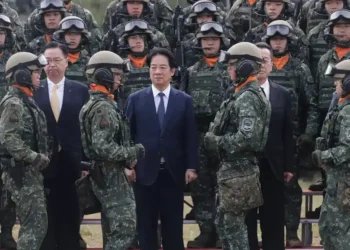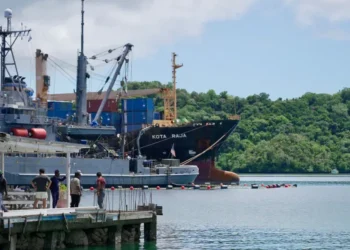Germany Sends Permanent Troops to Lithuania for First Time Since World War II
In a historic move, Germany has deployed a permanent military brigade to Lithuania, marking the first time since World War II that German troops will be based long-term outside the country. Chancellor Friedrich Merz officially inaugurated the new brigade on Thursday, emphasizing the importance of protecting NATO’s eastern flank amid ongoing concerns about Russian aggression.
A Historic Step for Germany and NATO
“This is a historic day,” said Lithuanian President Gitanas Nausėda after meeting Merz. “A day of trust, responsibility, and action.” The newly formed 45 Armored Brigade will bolster NATO’s presence near Russia’s Kaliningrad exclave and Belarus, key flashpoints given the tense geopolitical climate.
Germany has had troops stationed in Lithuania since 2017, but this new brigade represents a deeper and longer-term commitment. The unit will grow steadily, reaching its full strength of around 5,000 soldiers by the end of 2027, with bases located in Rukla and Rudninkai.
Military Might on Display
The inauguration in Vilnius was marked by a dramatic flyover of military helicopters above the city’s central cathedral square, despite rainy weather. Hundreds of troops and local spectators gathered as Chancellor Merz delivered a powerful message: “Protecting Vilnius is protecting Berlin.”
Germany’s Renewed Military Focus
This deployment comes as part of Germany’s broader effort to strengthen its military, the Bundeswehr, which has faced criticism for years of underinvestment. Since Russia’s full-scale invasion of Ukraine in 2022, Germany has ramped up defense spending, aiming to meet NATO’s guideline of dedicating 2% of GDP to defense.
Chancellor Merz highlighted this commitment: “Germany is investing massively in its armed forces. We want to send a clear message to our allies: It’s time to invest decisively in our security. The security of our Baltic allies is also our security.”
Germany’s recent 100 billion-euro special fund has helped meet NATO targets, but it will run out by 2027. To sustain momentum, the new coalition government has already eased borrowing rules to boost future military budgets. Merz, who is the first German chancellor with Bundeswehr experience, vowed to make Germany’s army “the strongest conventional force in Europe.”
Lithuania Leads by Example
Lithuania itself has pledged to increase its defense budget sharply, aiming to spend between 5% and 6% of GDP starting next year. This makes it the first NATO country to meet the 5% goal originally proposed by former US President Donald Trump.
There’s also a broader plan among NATO members to target 3.5% of GDP for defense by 2032, along with an additional 1.5% for defense-related infrastructure like roads and ports.
Defense Minister Boris Pistorius outlined Germany’s own plan to raise spending gradually by about 0.2 percentage points annually over the next five to seven years.
Diplomatic Efforts Amid Rising Tensions
Since taking office, Merz has actively pursued diplomacy to help bring about a ceasefire in Ukraine. “We stand firmly by Ukraine,” he said, “but we also stand together as Europeans and, whenever possible, with the US.”
Germany’s commitment to both military readiness and diplomacy highlights its pivotal role in Europe’s security landscape during a period of heightened tension with Russia.
This article was rewritten by JournosNews.com based on verified reporting from trusted sources. The content has been independently reviewed, fact-checked, and edited for accuracy, neutrality, tone, and global readability in accordance with Google News and AdSense standards.
All opinions, quotes, or statements from contributors, experts, or sourced organizations do not necessarily reflect the views of JournosNews.com. JournosNews.com maintains full editorial independence from any external funders, sponsors, or organizations.
Stay informed with JournosNews.com — your trusted source for verified global reporting and in-depth analysis. Follow us on Google News, BlueSky, and X for real-time updates.














